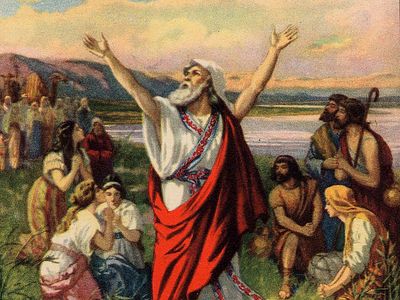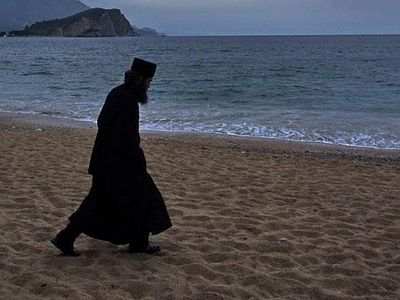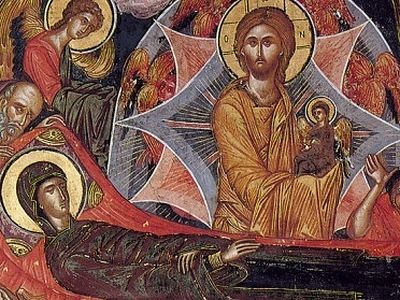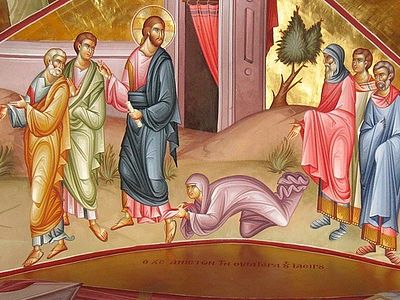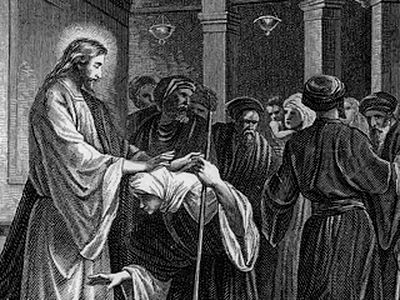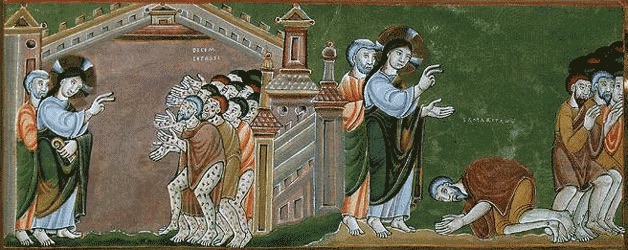
In the Name of the Father, the Son and the Holy Ghost.
The Gospel, all the Gospel is a gift of God to us, and although we are not continuously reminded of the need to be grateful, how can we not respond with gratitude to what the Gospel brings to us? God has so loved the world that He has given His only begotten Son that the world may be saved; and the Son has given Himself freely, in the sovereign freedom of His Divinity to us; no-one has taken His life from Him—these are His own words; He gave His life willingly, freely, that we may live.
And today we have in the Gospel a short example of the way in which we, most of the time, receive the gifts of God. Ten men came, covered with leprosy, condemned to a cruel death by illness, but also rejected ritually by their own people for the impurity of this infectious disease. They came to Him, but stood at a distance, because they knew that according to the Jewish Law they had no right even to come near Him or to touch Him. They asked for mercy. And God sent them to the priests to bring a sign of their gratitude for the healing which they had not even received; and they believed, and they went, and they were healed even before they reached their destination... We might have expected them to rush back to fall to the feet of Christ, to touch Him in gratitude. But no... Nine of them went their way; it was enough for them to have been healed—that was all they needed from God. One of them, however, turned round, and came to thank the Lord.
Isn’t this an image of the way in which we so often also behave? We pray, we ask the Lord for something that matters to us. It may not be life and death, it may just be that we need so much; we need one thing or another. Or, that we don’t even need it so much, but that we long for it so much. And then it is given us; and we receive the gift, and we rush into life with this gift in our hearts, this gift in our hands, we rush to life because it is enough for us that our prayer was fulfilled. How seldom it is that we come back, leaving our gift to be used later, but first of all turning to God and saying: What a wonder! What love You have! How great, how compassionate, how humble that You have responded to my prayer... One out of ten came back to the Lord Jesus Christ. How many of us have ever come immediately, before they took advantage of the gift, to turn to God with a smile, like a child turns and says, “Thank you!” even with a smile, without words, before taking advantage of what is given. And we loose so much by not being grateful; because if we would learn to be grateful for the obvious gifts of God, we would gradually discover that we can be grateful for a great deal more, for everything that Providence puts in our way—not only things we rejoice in, not only the wonders of life, but even the challenges of life, the things that require from us courage, greatness, and nobility; things that we fear. And how often could we overcome vanity by gratitude! Because vanity consists in looking at ourselves, and thinking how wonderful we are, forgetting that all that we are, all that we have is a gift of God. If only—every time we have said the right thing, done the right thing; been worthy of our human quality, human greatness and nobility, and also of the name of disciples of Christ—if every time we turned to God and said, ‘Yes! How wonderful are the words I have spoken, how good is the action I have performed—and everything was of You. The occasion was given by You, O Lord! I was able to perceive the need because You whispered into my heart: Look! I could understand because I had my mind enlightened by the Gospel! My heart responded because You touched it, and the heart of stone that I carry in my bosom most of the time became a heart of flesh full of compassion and understanding! And You gave me the means by which to meet the need, and the joy of meeting this need!
If we could respond to everything this way, we would discover that life is made into an act of worship and of gratitude.
Let us reflect on this, because within a just few weeks, a few days, we are coming to a day when our heart should be aflame with gratitude: for God has loved us so much as to become one of us. While we were strangers, alien to Him, often inimical to Him, He came, and He gave His life for us that we may live! We must prepare for it, for joy, gratitude, faith, openness to God does not happen all of a sudden—we must prepare for it. Let us reflect on what is going to happen—what happened nearly 2000 years ago that we shall remember as an actual event now, in a few weeks—and be ready, with a heart tilled, deeply furrowed by faith; by reflection, having thought out all our life. Let us be ready to receive the Lord like a shepherd, in the simplicity and purity of our hearts, or like the Wise Men in the deep understanding of wisdom. Amen!
